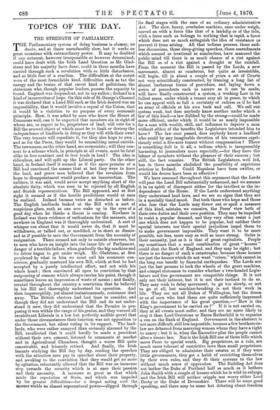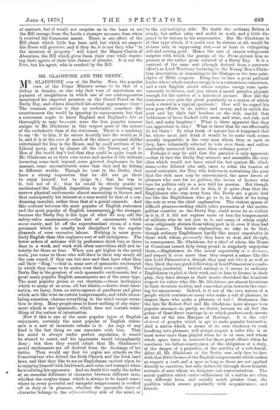TOPICS OF THE DAY.
THE STRENGTH OF PARLIAMENT. THE Parliamentary system of doing business is clumsy, no doubt, and at times unendurably slow, but it works on great occasions with extraordinary power. It may be doubted if any autocrat, however irresponsible or however determined, could have dealt with the Irish Land Question as Mr. Glad- stone and his majority have done; could in three months have carried through such a revolution with so little disturbance, and so little fear of a reaction. The difficulties at the outset were of the most formidable kind, difficulties such as tax the energy and the brains of that rarest kind of politicians, the statesmen who, though popular leaders, possess the capacity to found. England was despondent, not to say sullen ; Ireland in a kind of insurrection of hope. On this side of St. George's Channel it was declared that a Land Bill such as the Irish desired was an impossibility, that it would involve a repeal of the Union, that it would be a violation to no purpose of every economic principle. How, it was asked by men who know the House of Commons well, can it be expected that members six in eight of whom are, or expect to be, proprietors of land, will vote for a Bill the avowed object of which must be to limit or destroy the independence of landlords in doing as they will with their own? The very tenants will repudiate it, for they also hope to own ; and as for the Peers, they would be committing moral suicide. The townsmen, on the other hand, are economists ; will they con- sent to a scheme which, in principle at all events, must be fatal alike to free contract and to free trade in land ? The idea is ridiculous, and will split up the Liberal party. On the other hand, in Ireland itself it seemed as if the mere promise of a Bill had convinced the masses that at last they were to have the land, and grave men believed that the revulsion from hope to disappointment would produce an insurrection. The cottiers, it was said, would never accept anything short of the absolute fixity, which was sure to be rejected by all English and Scotch representatives. The Bill appeared, and at first sight it seemed as if the hostile predictions would at once be realized. Ireland became twice as disturbed as before. The English landlords looked at the Bill with a sort of suspicious glare, such as one sees wake up in the eyes of a good dog when he thinks a threat is coming. Nowhere in Ireland was there evidence of enthusiasm for the measure, and nowhere in England was it thoroughly understood. A sort of whisper ran about that it would never do, that it must be withdrawn, or talked out, or modified, or in short so dismis- sed as if possible to save the Government from the necessity of resignation. There seemed not only to outside observers, but to men who have an insight into the inner life of Parliament, danger of a terrible failure, when gradually the big machine and its driver began to get under weigh. Mr. Gladstone, at first perplexed by what in him we must call his economic con- science, gradually mastered his own Bill, which at first he had accepted by a purely intellectual effort, and not with his whole heart ; then convinced all open to conviction by that outpouring of reasons which always carries his point, though it sometimes leaves an impression of waste of means ; and finally, created throughout the country a conviction that he believed in his Bill and thoroughly understood its operation. And then imperceptibly, yet almost instantaneously, resistance died away. The British electors had had time to consider, and though they did not understand the Bill and do not under- stand it now, they did understand that the Premier in pro- posing it was within the range of his genius, and they warned all recalcitrant Liberals in a low but perfectly audible growl that under those circumstances their function was not opposition to the Government, but silent voting in its support. The land- lords, who were rather annoyed than seriously alarmed by the Bill, recollected that it could hardly be made a precedent without their own consent, listened to comments at market and in Agricultural Chambers, thought a worse Bill quite conceivable, and leisurely retired. And finally, the Irish tenants studying the Bill day by day, reading the speeches with the attention men pay to speeches about their property, and awaking to the conviction that they would get no more by agitation, reluctantly allowed that the Bill was an immense step towards the security which is at once their passion and their necessity. A measure as great as that which made the reputation of Stein, and which was impeded by far greater difficulties—for a despot acting with the masses wields an almost supernatural power—slipped through its final stages with the ease of an ordinary administrative Act. The slow, heavy, overladen machine, once under weigh, moved on with a force like that of a landslip or of the tide, with a force such as belongs to nothing that is rapid, a force which does not so much extinguish the idea of resistance as prevent it from arising. All that tedious process, those end- less discussions, those sleep-giving speeches, those amendments which seemed as irrational as numberless, have manured the public mind till there is as much chance of a riot against the Bill as of a riot against a drought or the rainfall. From the moment the Bill is passed by the Lords, a new movement, almost as cumbrous, but quite as irresistible, will begin, till in about a couple of years a set of Courts. not very scientifically constructed, by framing a long list of almost barbarous forms of procedure, and laying down a series of precedents each as narrow as it can be made, will have finally constructed a system, a working Law in its fullest sense, under which a tenant may sit in peace, to which he can appeal with as full a certainty of redress as if he had an army of officials at his own beck and call. We call our- system weak, but does anybody know another under which a law of this kind—a law disliked by the strong—could be made more efficient, under which it would be so nearly impossible for a man with wealth, skill, and influence to deprive a man without either of the benefits the Legislature intended him to have The law once passed, does anybody know a landlord who could by any imaginable devotion of his resources capri- ciously evict a five-acre tenant without compensation There is something dull in it all, a tedium which is inexpressibly harassing, to journalists more especially,—for they have the labour of members without the pleasure of their success ; but still, the fact remains. The British Legislature, well led, has in three months abolished the possibility of capricious eviction in Ireland. Could Napoleon have been swifter, or would his decree have been so effective ?
We have assumed throughout this argument that the Lords will pass the Land Bill substantially unharmed, and we assume it in no spirit of disrespect either for the intellect or the in- dependence of the House. If the Lords understand anything they understand land laws, and we see no signs that they are in a specially timid mood. But both those who hope and those who fear that the Lords may throw out or spoil a measure of this kind, mistake, we conceive, the Peers' view both of their own duties and their own position. They may be impelled to resist a popular demand, and they very often resist a just one which does not happen to be popular, but neither their special interests nor their special prejudices impel them to to make government impossible. They want it to be more possible, not less, more easy as well as more strong. Order is their necessity, just as it is that of great capitalists. People say sometimes that a small combination of great " houses " could shut the Bank of England, and they may be right ; but there is no danger of such a catastrophe, because those houses are just the houses which do not want "crises," which cannot in the long run benefit by financial earthquakes. The Lords are just the last persons to lock the wheels of the great machine, and compel statesmen to consider whether a two-headed Legis- lature and free government are compatible things. It is not only not their interest, but it is not their instinct to do so. They may wish to delay movement, to go too slowly, or not to go at all, but machine-breaking is not their work in life. They are not all Dukes of Wellington, but the dozen or so of men who lead them are quite sufficiently impressed with the importance of his great question,—" How is the King's government to be carried on ?" If it is not carried on, they at all events must suffer, and they are no more likely to stop it than Lord Overstone or Baron Rothschild is to organize a run on the Bank of England. Government in the abstract is not more difficult, still less impossible, because a few brothers-in- law are debarred from marrying women whom they have a right to marry ; but it is, when the Executive plus the people cannot alter a tenure law. Nor is the Irish Bill one of those bills which move Peers to special wrath. Big proprietors, as a rule, are much more tolerant of restrictive laws than small proprietors. They are obliged to administer their estates as if they were little governments, they get a habit of restricting themselves by their own rules, and they fit their systems to the law without much sense of oppression. The Building Act does not bother the Duke of Portland half as much as it bothers John Smith with a couple of houses which he is wild to enlarge, and the Irish Bill will neither cripple nor worry either Lord Derby or the Duke of Devonshire. There will be some good speaking, and there may be some hot debating about freedom of contract, but it would not surprise us in the least to see the Bill emerge from the Lords a stronger measure than when it received the Commons' assent. There is one effect of the Bill about which little has been said, but which we suspect the Peers will perceive; and if they do, it is not they who "in the interests of property" will reject the Magna Charts of Absentees, the Bill which gives them their rent while depriv- ing their agents of their best chance of plunder. It is not the Peer, but his agent, who is crushed by the Bill.































 Previous page
Previous page